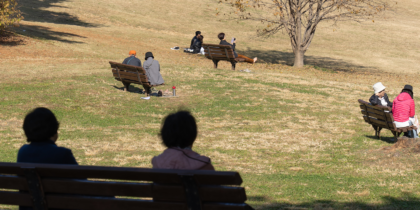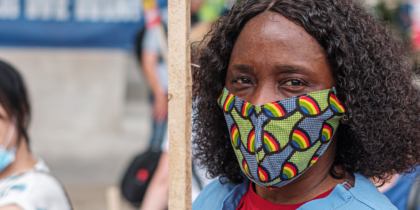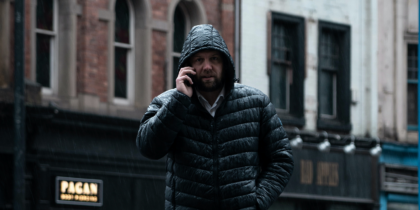Since the start of 2023, Centre for Mental Health has hosted a series of five webinars exploring Five Giants for Mental Health. Through our Festival of Ideas, we’ve explored poverty and income inequality; racial injustice; children and young people’s mental health; mental health services; and the climate crisis. Each sought to bring new and emerging ideas into focus, to help to identify positive solutions to five of the biggest long-term issues for people’s mental health.
The ideas brought to the surface across the five events were necessarily diverse, covering a broad range of issues requiring actions at many different levels.
In addressing poverty and financial inequality, we heard about the importance of having enough money to live on as a foundation stone for our mental health. Too many people in the UK today miss out on this basic need. So we heard about the importance of tackling this – for example through the Joseph Rowntree Foundation’s Essentials Guarantee campaign, and by rethinking housing as a social rather than economic good. Crucially, alongside these measures, we heard about the harmful effects of benefits policies that place harsh conditions on claimants and threaten sanctions on some. For people from racialised communities, such policies overlap with the ‘hostile environment’. So rather than threatening people with destitution, we need systems that help people to fulfil their own ambitions, on their own terms.
On supporting better mental health among children and young people, our panellists emphasised the importance of changing society and its institutions to create better conditions for a good start in life. That includes schools, where the curriculum and approaches to behaviour seek to maximise wellbeing as well as attainment; youth clubs and services where creativity, social action and coproduction create a stronger sense of belonging and agency; and open access Early Support Hubs for young people seeking support for their mental health. All need to combine an atmosphere of hope and empowerment with a deep understanding of the structural inequities that put so many young people’s mental health at risk in the first place.
In confronting institutional racism, we discussed the deeply embedded discrimination and oppressive practices that racialised communities in the UK experience from public services, including in the mental health system. People from racialised communities are ‘under-protected and over-policed’ in a damaging cycle of distrust with public services whose job is to keep people safe. The solutions to this cycle lie in communities: in social action projects such as Young Changemakers, in community organisations that can help to mend the gap with public services, and in overhauling both commissioning and philanthropic systems that perpetuate disadvantage and discrimination.
Similar themes emerged in our event focused on mental health services: the importance of decolonising mental health services, acknowledging and making reparation for harms; extending participatory approaches to mental health care, for example by creating more experiential roles alongside existing professional positions; and helping services to work with humility, working relationally with people. This event also brought into focus the importance of mental health services ‘supporting people to have really good mental health’, looking not just at individuals but communities and networks, too, and supporting people with their life goals.
Our final event focused on one of the biggest threats to our mental health long-term, one which is already bringing great harm globally but perhaps not yet recognised as an immediate risk in the UK: the climate crisis. Our panellists for this event spoke about the disproportionate effects of pollution on racialised and disadvantaged communities, the direct impacts of climate change on mental health (for example from flooding and wildfires), and the wider effects stemming from displacement and loss of livelihood. As panel member Agnes Agyepong put it, “we’re getting a taster now [of these impacts] and if we do nothing, it’s only going to get worse.” The solutions to the climate crisis are, of course, global and require action at every level. Speakers emphasised the importance of ‘nature-based’ solutions – for example tree-planting and natural flood management – investing in green spaces, implementing ‘green’ policies that reduce rather than increase financial inequality, and empowering communities to produce their own solutions locally.
Throughout the Festival of Ideas, we sought to focus attention on solutions – sustainable and practical approaches to addressing the ‘five giants’ for our mental health. The themes that emerged throughout resonate with much of what we have found in our research to date. That mental health is made in communities. That power and wealth imbalances drive distress. That the global and the local aren’t that dissimilar after all – and action at one level must be matched at every other to achieve real and lasting change.
From global action to cut greenhouse gas emissions and national policies to end child poverty, to the individual interactions people have with mental health services, we could all have better mental health if governments and societies collectively sought to take actions that would make a real difference. Every one of the ideas shared in our five events would make a big difference on its own. Few of them are new – many have been known about, if not acted upon, for decades or more. Added together, of course, their effects would be far greater still – one reason why we continue to advocate strongly for a comprehensive national long-term mental health plan.
One thing that is clear is that we can’t keep going on as we are. Doing nothing means more people enduring more distress, at an ever-greater cost, without the right help being available at the right time. So we have to move from ideas to action. While many of the ideas that have surfaced during the Festival require national or even international leadership, there’s lots that can happen locally, in systems and public services, and in the actions and decisions of commissioners and charitable funders. Some of those actions require people and organisations to cede power, embrace coproduction, and accept that current ways of working aren’t sustainable.
If all this seems impossible, it’s worth remembering that large-scale change doesn’t have to be unattainable. In decades gone by, all long-stay asylums were closed, replaced by the community and inpatient mental health services we have today. Our social attitudes towards mental health and illness have changed markedly in the last 15-20 years, thanks to the efforts of campaigners to challenge stigma and discrimination. While these are both still works in progress, they demonstrate that major change can happen in the right conditions: with sustained political commitment, resources, and a willingness to change. And by having high expectations, believing that social change is possible, without thinking it’s easy, together we can strive for better mental health for all.
The Festival of Ideas would not have been possible without our brilliant speakers, chairs and panel members, the people who took time out of their days to participate in the events or listen back to the recordings, and the dedicated team at Centre for Mental Health who organised the Festival. Thank you to everyone who made it possible and created such a lively and thought-provoking series.
Watch back all our Festival of Ideas events here.









